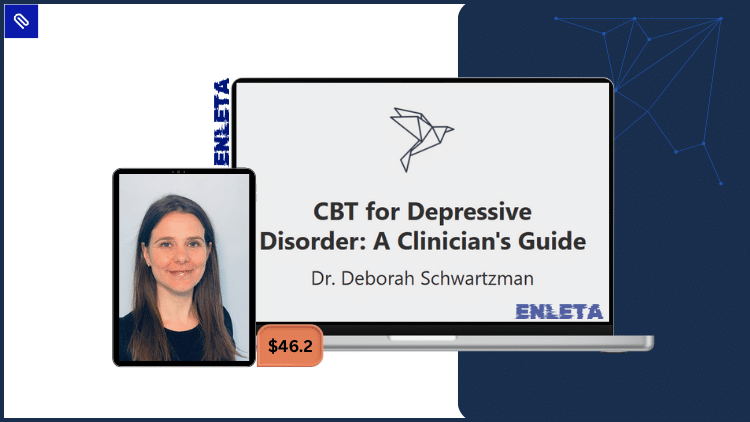CBT for Depressive Disorder: A Clinician’s Guide by Dr. Deborah Schwartzman For Digital Download!
“CBT for Depressive Disorder: A Clinician’s Guide” is a continuing education course offered by ASADIS, taught by Dr. Deborah Schwartzman, Psychologist.The course provides about 3 hours of content, split into 24 lessons of 5 to 15 minutes each, accessible over approximately four months (with auto-extension until completion). Learners receive a certificate of achievement, downloadable PowerPoint, a bibliography, and voucher for course evaluation.
The material covers a full CBT protocol for Major Depressive Disorder (MDD) and related depressive disorders. Topics include assessment, case conceptualization, behavioral activation, cognitive restructuring, mood regulation, problem-solving, communication techniques, relapse prevention, and more. The course is meant for clinicians (psychologists, therapists, counsellors) wanting to enhance their evidence-based interventions for clients with depressive disorders.
CBT for Depressive Disorder: A Clinician’s Guide by Dr. Deborah Schwartzman Free Download – Includes Verified Content:
Why Should You Choose This Course?
Many clinicians seek long-tail answers such as “how to deliver cognitive behavioral therapy for major depressive disorder in clinical settings” or “best CBT interventions to reduce relapse in depressive patients”. This course addresses these exact needs by offering a structured, research-grounded guide. It does more than theory: it shows how to assess, conceptualize, and tailor treatment plans for individuals with depressive disorders.
Another reason is that the course is accredited by recognized professional bodies (e.g., Canadian Psychological Association, etc.), giving validity to its continuing education credits. The fact that it provides short lessons lets busy practitioners manage time well—sessions of 5-15 minutes allow learning in bite-sized portions, while still covering important topics like safety planning, mood regulation, and relapse prevention.
Also, the inclusion of clinical examples, downloadable materials, and actionable interventions makes this course especially valuable for those who want “evidence based CBT tools for depressive disorder treatment” or “practical strategies for treating MDD in therapists’ practice”. The course’s design to guide through conceptualization, intervention, and maintenance ensures that what is taught can be applied immediately in clinical work.
What You’ll Learn
By completing CBT for Depressive Disorder: A Clinician’s Guide, participants will acquire the following competencies and tools:
-
Foundations and Assessment in Treating Depression: Understanding diagnostic criteria for Major Depressive Disorder and other depressive disorders; dimensions of depression; performing risk assessments; case conceptualization.
-
Cognitive Interventions & Restructuring Techniques: Identifying distorted thoughts; maladaptive schemas; cognitive restructuring and additional cognitive strategies; illustrating examples of cognitive interventions.
-
Behavioral Activation & Activity Scheduling: Techniques to overcome inactivity and anhedonia; lifestyle adjustments; mindful awareness; goals-based scheduling to re-introduce engagement and reward in clients’ lives.
-
Mood Regulation, Relaxation Training & Emotional Awareness: Skills in emotional awareness, regulation, mindfulness, relaxation to manage fluctuating mood states.
-
Communication and Problem-Solving Skills: Applying communication techniques to address daily life challenges; problem solving in therapy to help clients cope with stressors.
-
Specifiers & Other Considerations: Taking into account different specifiers in depressive disorders (e.g. severity, chronicity) and adapting treatment accordingly.
-
Relapse Prevention and Termination: Strategies to help sustain therapeutic gains; planning for maintenance after acute treatment; preparing for potential setbacks.
-
Practical Tools & Resources: Downloadable PowerPoint, bibliography for further reading, evaluation tools; video‐based clinical examples illustrating the techniques.
These learning outcomes align with long-tail needs like “how to maintain treatment gains and prevent relapse in depressive disorder using CBT” and “step-by-step CBT plan for treating major depression in clinical practice”.
Who Should Take This Course?
CBT for Depressive Disorder: A Clinician’s Guide is designed for mental health professionals seeking to deepen their competence in treating depressive disorders. Relevant audiences include:
-
Licensed Psychologists, Clinical Social Workers, Therapists, Counsellors who already use CBT or related therapeutic approaches and want to refine their work specifically around major depressive disorder.
-
Graduate Students in Clinical Psychology or Counselling who are preparing to work with depressed clients and want evidence-based tools to build treatment protocols.
-
Psychiatrists and Mental Health Practitioners wanting non-pharmacological interventions to complement medication, especially focusing on behavioral activation, cognitive restructuring, and relapse prevention.
-
Clinicians interested in long-tail skills development such as “improving case conceptualization in severe depression”, “managing anhedonia and inactivity with behavioral activation”, or “applying relapse prevention in psychotherapy for depressive disorders”.
-
Professionals seeking continuing education units (CEUs) in accredited courses that are practical, clinically relevant, and structured for time efficiency (short lessons) while covering depth and breadth.
-
Mental health service providers in clinic or telehealth settings who wish to apply CBT protocols effectively in varied contexts (in-office, online, group or individual therapy) and adapt interventions to specifiers of depression.
Conclusion
For clinicians committed to delivering high-quality, evidence-based care for individuals with depressive disorders, CBT for Depressive Disorder: A Clinician’s Guide offers a comprehensive, clinically grounded training program. By covering assessment, case conceptualization, core CBT interventions like behavioral activation and cognitive restructuring, mood regulation, relapse prevention, and communication/problem solving skills, this course delivers the long-tail expertise needed for effective depression treatment.
This course stands out for synthesizing theoretical foundations with practical tools and clinical examples, tailored for therapists wanting to improve outcomes for clients struggling with Major Depressive Disorder and related conditions. Therapists looking to enhance their practice with “structured CBT protocols for depressive disorder in clinical settings” will find this training especially beneficial.
Advance your clinical practice today — enroll in CBT for Depressive Disorder: A Clinician’s Guide and equip yourself to deliver evidence-based CBT interventions that help clients recover, sustain well-being, and prevent relapse.










Reviews
There are no reviews yet.